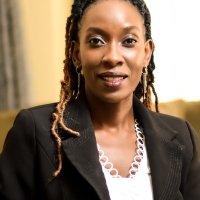Making the Dividend Count: Bridging the Gap between Demographic Dividend Evidence and Africa’s Policy Process
On April 12, 2018, the Wilson Center Africa Program hosted an event entitled, “Making the Dividend Count: Bridging the Gap between Demographic Dividend Evidence and Africa’s Policy Process.” Introductory remarks were given by Ms. Shahrazad Hired, Program Assistant at the Wilson Center Africa Program. Dr. Monde Muyangwa, Director of the Africa Program, moderated the event. This event featured Ms. Diana Warira, current Southern Voices Network for Peacebuilding Scholar at the Wilson Center and Communications Officer at the African Institute for Development Policy (AFIDEP); Ms. Alexandra Davis, Legislative Fellow for Foreign Policy at the Office of U.S. Senator Christopher Coons; and, Ms. Erin Collinson, Senior Policy Associate and Assistant Director of the U.S. Development Policy Initiative at the Center for Global Development.
Ms. Warira opened the discussion by outlining the central role that communication has played in bringing demographic dividend research to the forefront in Africa’s policymaking space. She outlined the importance of the demographic dividend to development across Africa. She raised the key point that the rapid expansion of the African population can be used to maximize economic growth if the right policies are put in place, which boost investments in population. Prioritizing the demographic dividend will lead to policies which encourage the provision of universal access to quality education, employment, and security. Ms. Warira outlined three important elements for effective communication with policymakers: framing, timing, and relationships. On framing, she noted the importance of presenting research so that it aligns with and supports the long-term development goals of policymakers in order to increase the probability of their receptiveness to the empirical evidence provided by experts. She used Cameroon as an example on the challenge of framing research when she described the role of socio-cultural sensitivities in preventing the implementation of policies that push for the reduction of fertility rates. Some religious and cultural factors can inhibit the demographic agenda as it can be perceived as pushing a western agenda of family planning and population control, rather than framed as a model for overall development. Another challenge that Ms. Warira underlined is the competitive nature of the policymaking space. For this reason, experts need to be intentional about the timing of presenting their work to policymakers and seize strategic moments to communicate. Ms. Warira completed her remarks by emphasizing the value of establishing relationships between demographic dividend experts and policymakers. Mutually beneficial dialogue and interactions between experts and policymakers will pave the way for prioritization of the demographic dividend, and for sustainable development in African countries.
Ms. Erin Collinson focused her remarks on the successful communication mechanisms used to push evidence-based research to policymakers. Her key points were that it is essential to make evidence-based research as accessible as possible in order to increase the use of experts’ work in policymaking. Having knowledge of the target audience and providing clear and concise research with informative bullet points or takeaways enhances the effectiveness of communication with policymakers. Ms. Collinson also emphasized the importance of seeking diverse outlets for getting research across to policymakers, such as blog posts or podcasts. Furthermore, Ms. Collinson highlighted the effectiveness of building relationships between experts, the development community, and policymakers. Strong relationships precede the establishment of working groups that produce evidence-based reports, which enhance the impact of policies. Finally, Ms. Collinson underlined the fact that policymaking is a non-linear and lengthy process. As such, patience is required when seeking results. It is thus essential to continue seeking out windows of opportunity as ongoing developments may give new relevance to conversations centered on different policies.
Ms. Alexandra Davis explored the issue from the perspective of a staff member on Capitol Hill who works with Congress. She reiterated Ms. Collinson’s comments about the need to produce concise evidence-based research by focusing on three key pieces of information that the target audience finds relevant. Producing lengthy documents discourages policymakers from engaging with research. Ms. Davis added that effective communication of evidence-based research is enhanced by tailoring your language to your target audience and by providing them with appropriate and actionable steps. Before communicating evidence, researchers should be aware of the policy recommendations that they will offer as well as the policymaking toolbox of their target audience. Not only must your recommendations be concrete, but they should also be actionable for your target audience. Once again, the pertinence of building relationships was articulated as policymakers are more likely to reach out to experts whom they are familiar with in order to find empirical evidence to support policy decisions. Thought leaders should be reaching out to policymakers to share your work as much as staff members are reaching out to the research community to seek evidence.
The Southern Voices Network for Peacebuilding (SVNP) is a continent-wide network of African policy and research organizations that works with the Africa Program to bring African analyses and perspectives to key issues in U.S.-Africa relations. Funded by the Carnegie Corporation of New York since 2011, the project provides avenues for African researchers to engage with, inform, and exchange perspectives with U.S. and international policymakers in order to develop the most appropriate, cohesive, and inclusive policy frameworks for the issues of peacebuilding and state-building in Africa.
This event was livetweeted and webcast. Follow the Africa Program Twitter account @AfricaUpClose and catch up on the conversation #EvidenceBasedPolicy.
Speakers

Communications Officer, African Institute for Development Policy (AFIDEP)
Moderator

Hosted By

Africa Program
The Africa Program works to address the most critical issues facing Africa and US-Africa relations, build mutually beneficial US-Africa relations, and enhance knowledge and understanding about Africa in the United States. The Program achieves its mission through in-depth research and analyses, public discussion, working groups, and briefings that bring together policymakers, practitioners, and subject matter experts to analyze and offer practical options for tackling key challenges in Africa and in US-Africa relations. Read more
